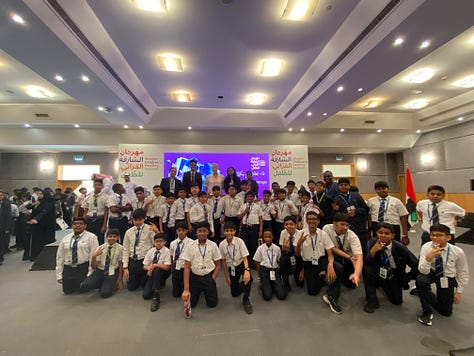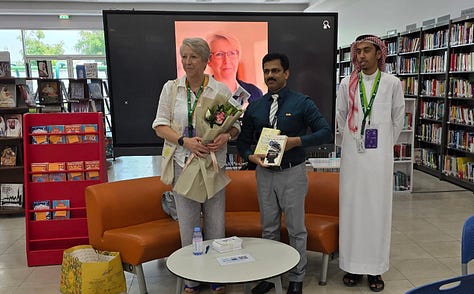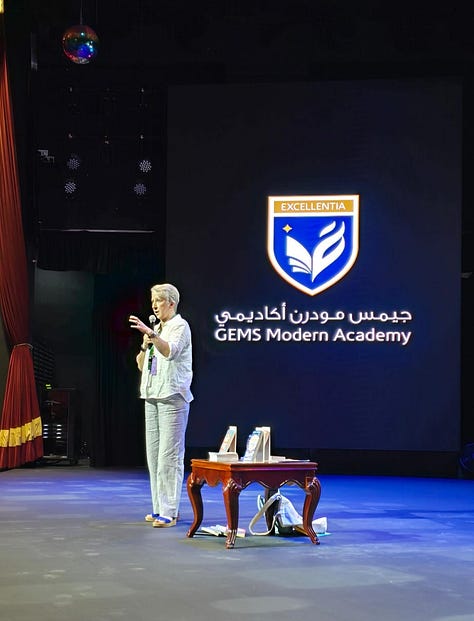This is the second in my series of posts triggered by my recent trip to the Sharjah Children’s Reading festival. The first was here: Eating Porridge From a Stick.)
This one is about the teenagers I met there. Teenagers are all human, each individual but also conforming to group behaviour and reflecting their cultures.
The first thing to say here is that I do not know how unusual the experiences I had on this visit were. I don’t know if I was given the “best” schools and the “best” students, however we might define those. I do know that they fit with what I experienced on previous visits to Middle Eastern countries. I’ve travelled widely in Asian countries, too, as well as throughout the UK and I have done online events for many other countries.
On this visit to Sharjah, I gave a talk with Q&A to a large audience of teenagers from five or six different schools and then visited the GEMS Modern Academy in Dubai, where I gave a talk to a large audience of 11-16 year olds and was also interviewed by some individuals and groups. I understand that the majority of the students I spoke to were of Indian and Pakistani heritage.
The most obvious thing to notice was the incredible respect every single student showed me. They listened - no, really - and they asked questions that were genuine, deep, respectful and showed a real desire to learn. Most began with some words which certainly reminded me I was not in the UK, along the lines of “Ma’am, I am honoured to listen to you” or “Ma’am, thank you for sharing your wisdom with us”. If this happened in the UK, I would know someone was taking the p*ss.
Some of you might be thinking, “So, what? They’re just doing what they’ve been trained to do. They didn’t actually respect you or think your words might be important: they were just being obedient, following rules for reward.”
I don’t think so. Maybe sometimes but largely not. I had a load of conversations, sometimes out of ear-shot of staff, and they simply could not have kept up the façade so consistently. And I listened to them a lot, too, rather than simply talking to them. And what they said showed the same maturity and willingness to learn.
Some of you might be thinking, “Why should they automatically respect you? Surely they should be more critical than that? Should they not challenge and test you, rather than believing you just because you’re an adult?”
But it’s not just because I’m an adult. I’m an adult who has a very good, analytical brain; I’m an adult who knows a lot about the things I speak of (and who doesn’t bother speaking of things I don’t know about) and who has read vast quantities of research to inform my insights. I’m an adult who is respected by other adults in the field. I’m an adult whose visit their schools (etc) have spent a lot of money to bring about. I’m an adult who manifestly cares about young people and whose sole purpose in standing in front of them is to help them and make their lives better.
What happens when I visit UK schools to talk to teenagers?
Actually, I now don’t. I don’t, because of what it does to me. I don’t, because it is not the best use of the school’s precious money. I don’t, because I’ve had enough of being treated with disrespect, of not being heard, and of feeling I’ve wasted my time and energy.
I still visit schools to talk to parents, teachers or senior leadership teams, but not to students. (I do still do some things online, with select teenage audiences.)
When I started visiting schools, back in the early 2000s, I had so many good experiences, met so many teenagers who I could tell were listening and valuing at least some of what I said, had so many useful conversations with them. But something changed, probably around 2019 (before Covid, certainly). I started to have to spend nearly half the session trying to show them that I might be worth listening to. And, since I’m not cheap, that’s a real waste of a school’s money.
I started to receive what I came to realise were misogynistic remarks and behaviour, sometimes during my talks, sometimes during the Q&A and sometimes afterwards. I would occasionally receive absolutely unacceptable emails from boys - in two cases traceable to their school email address, one of which I had to speak to the school about and the other which I ignored. The flagrant sexist disrespect was very had to ignore.
At first I thought it was my fault - and that, of course, is how this stuff goes. Now I know it’s not my fault. But I don’t know how to change it.
I don’t want children “to be seen and not heard” or to have automatic complete respect for and trust in every adult they come across. But there’s something rotten in a society that allows children to start from a position of automatic disrespect.
Of course, in every audience there were always also delightful students, keen to listen and learn and think, who wanted support and were grateful for it. But I am no longer prepared to search for them. I am too tired, too demoralised and too keen to spend whatever reserves of energy and whatever healthy life-span I have left doing things that feel useful, both for my sake and because I’d rather be certain of helping a few than battling to unplug the ears of those who don’t choose to listen. As I get older, I become increasingly aware that my energy and brainpower is finite and so it becomes more, not less valuable. It is my job to use it well and not waste it. I value it even if some people don’t. And I matter, frankly.
Where did the watermelon come in?
When I arrived at the school in Dubai, after a very long and hot journey, I was greeted with a wine goblet of watermelon juice, presented on a silver tray by a smiling man who welcomed me and my Emirati minder. It was the best drink I have ever tasted and at exactly the right moment. I was offered sandwiches, too. I didn’t accept at that point as I was about to speak but fortunately I was offered again afterwards and was able to say yes. It turned out to be an incredible lightly toasted sandwich filled with roast vegetables and a creamy cheese. Accompanied by the best coffee I’ve tasted outside Spain (my favourite coffee destination).









At every turn in this school, I was treated delightfully by adults and young people alike. I was taken to meet the Principal, visit the library, talk to various groups of students who had chosen to meet me. I witnessed lots of noisy excitement because Year 11s were getting their exam results and lots of parents had come in to witness this. A boy was passing round incredible chocolates and offered me one. And I was given a huge bunch of flowers and an even huger box of the same chocolates all for myself!
The staff, led by the wonderful award-winning librarian, had prepared the students wonderfully. He had created a PowerPoint presentation which was shown to everyone before I spoke, and vast slides of information about me behind me on the enormous stage. Two fantastic and confident girls compered the whole event brilliantly - an adult couldn’t have done it better. And the audience was sparky and exuberant, not just respectful.
It was exhausting and brilliant. (As was the talk for the students who came to the festival to see me.)
Here is the report that one senior student wrote about my visit:
She was incredible to talk to and I will soon be writing something about a conversation I had with her, which I think might well help many students struggling with time management and focus.
I feel guilty and rather sad when I say that this visit was so different from what I experience in the UK. I love my country and how it values independent thinking, I respect that respect should be earned rather than being automatic, I get that teenagers may not think that a 60+ woman is worth listening to and I get that I might sound entitled if I say that I am worth listening to.
But I am. I’ve worked hard for this; I’ve done my research; I’ve applied high-end critical thinking; I listen; I’m open to changing ideas. But if anyone thinks that because I’m a woman or because I’m over 60 (with all that wisdom) I am not worth listening to or treating with respect, then I feel sorry for them because they will miss some words that might help them have a better life. yes, we have to be critical, but if you don’t first listen you’ve got nothing to be critical about.
Fortunately, there are still my books! And I will shortly have some very good news about that. If anyone is listening…
Big, big thanks to every human, in any country in the world, who starts from a position of “this woman might be worth listening to so let’s have a listen and see.” I know you’re out there and you deserve all the success and fulfilment that come your way. Especial thanks to The GEMS Modern Academy in Dubai and its excellent librarian, staff and students. And the man who made the watermelon juice and sandwich!


Interesting read but it sounds like your experience sadly highlights the wealth gap. Having worked in an international school in Europe (which my children also attended) and now working in a state school I also see these differences in teenagers attitudes (not all, but some) but equally I am also aware that none of my current students are living in homes with maids, butlers, drivers or having 4-5 holidays a year or, more to the point, not with affluent and probably better educated parents. It's a battle for some of them to even get to school so sometimes it's no wonder they feel angry towards adults - and disrespectful, probably because they are not shown much respect themselves. It's a shame as they could probably do with more outside visits to be shown there is another way to get and give respect.
This was so interesting to read. I'm a good bit younger but pulled back from school events a few years ago, though I still love working with young people who've chosen to be there, and, wow, this resonated a lot. (Not so much the fancy times, it must be said, but I'm glad you've had lovely experiences to balance out the less pleasant ones!) Thanks for sharing.